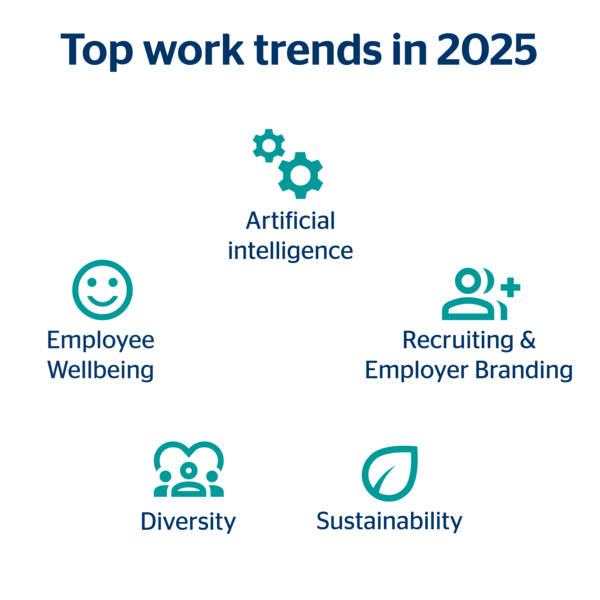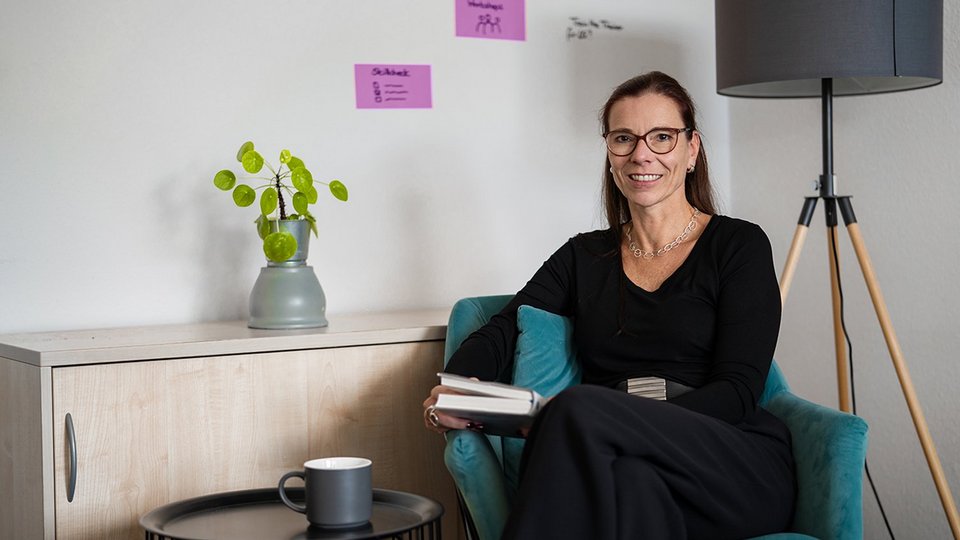The top 5 work trends in 2025
|

reading time: ca. 5 minutes
- Work trends are long-term developments that shape the job market. Those who prepare for current trends in good time are well positioned for the future and remain competitive.
- Digital technologies and artificial intelligence will continue to accompany us in 2025. New AI tools and VR offer many opportunities to speed up processes and improve digital collaboration.
- Corporate responsibility is key. This not only includes social responsibility, sustainability, diversity, and equality. There is also an increasing focus on the well-being of employees.
- Recruiting is getting more individual, personalised, and proactive. Strong employer branding attracts new talent and retains existing employees. HR is getting more support from AI tools and data-driven analyses (HR analytics).
The professional world is constantly changing. Things that are new and special today may be standard tomorrow. For companies this poses both opportunities and challenges. Our expert Petra Kuhlmann, Director of People Management at OVB Holding, gives an outlook on the future of the job market and the 5 most important work trends for 2025.
Digitalisation, New Leadership, and work-life balance: many topics that define our working world today were unthinkable 50 years ago. Gone are the days of strict hierarchies, on-site work and authoritarian leadership. Our work has become more digital, international, individual, and flexible.
Megatrends such as connectivity, New Work and globalisation are not only influencing our society. They are also reflected in the economy and the job market. This can be seen, for example, in the current working standards, the expectations of job seekers, and the demands placed on companies.
What can we expect in the workplace in 2025?
What are the work trends for 2025? We spoke to an expert who knows and observes developments on the job market very closely.

Petra Kuhlmann has been part of the OVB team since 1993. As Director of People Management, she experiences the changes in the working world at first hand and knows what issues and challenges the market is facing.
At the same time, she looks after the well-being of the employees and supports every team member at OVB from day one.
To strategically position yourself for the future, it is important to recognise and understand upcoming work trends at an early stage. This benefits not only companies, but also employees, job seekers, and freelancers.
These are the 5 work trends we expect to see in 2025:
- Artificial intelligence
- Employee wellbeing
- Diversity
- Sustainability
- Recruiting & employer branding

1. Artificial intelligence
Artificial intelligence (AI) is one of the most significant work trends of our time and is fundamentally changing the working world. AI tools continue to develop and offer more and more possibilities, especially for automating certain processes.
At the same time, it is important that people raise their awareness of the limits and risks of artificial intelligence.
In recruiting, for example, some companies use AI tools to analyse CVs and profiles and match them with the job requirements. In the future, they could even analyse job interviews and predict the cultural fit. Chatbots could guide candidates through the application process.
The technological development is expanded by Virtual & Augmented Reality (VR/AR). This creates new opportunities for training, digital collaboration, and virtual onboarding. Virtual offices improve communication in remote teams, and simulations make it easier for employees to be trained in complex tasks.
2. Employee wellbeing
More and more companies are focussing on the health and well-being of their employees. Overwork and dissatisfaction not only have a negative impact on individuals, but also on productivity and performance of the company as a whole.
Employee wellbeing is important for the company's success and a key factor in recruiting and retaining talent.
The focus is on creating a healthy balance between professional demands and personal well-being. Companies are increasingly investing in programmes that improve satisfaction and health. This ranges from flexible working hours and fitness programmes to stress management initiatives.
3. Diversity
Diversity in the workforce has become an integral part of the working world.
Diversity goes far beyond the representation of gender or ethnic origin. It is about strengthening all forms of diversity, including age (“multigenerational workforce”), cultural and social backgrounds, sexual orientation, and different perspectives on life.
An increasing number of companies are recognising the value of diverse teams. Diverse and equal teams have a competitive advantage that goes far beyond ethical considerations: diversity leads to more innovative solutions, more creativity, and better adaptability.
4. Sustainability
Sustainability is playing an increasingly important role in the modern working world. Companies are developing more environmentally friendly business models. However, sustainable behaviour is not limited to production processes and energy consumption, but also encompasses the corporate culture.
Remote work helps to reduce the ecological footprint of companies by minimising commuting and office space requirements. At the same time, many companies are focussing on sustainable offices, environmentally friendly materials, and fair working conditions.
Sustainability is not a short-term trend, but a central component of the future workplace.

In recruiting and employer branding, there are several developments that are changing the job market:
- Innovative technologies: Artificial intelligence supports the recruitment process. For example, it helps to analyse CVs and find suitable candidates more quickly.
- Active sourcing: Digital networks and social media are used to target potential job applicants. Instead of waiting for people to apply on their own, recruiters proactively approach promising talent.
- Candidate experience: The experience a person has throughout the application process is becoming more important. Many employers now rely on personalised, individual, and transparent processes.
- Supra-regional recruiting: Remote working means that employees do not necessarily have to live in the immediate vicinity of a company. Supra-regional or even global recruiting expands the talent pool.
- Purpose economy: Young people in particular are placing more value on companies that not only offer attractive working conditions, but with which they can identify. They are looking for work with purpose.
- Skill-based hiring: Recruiters and companies are increasingly focussing on the specific skills a candidate brings to the table. Skills are becoming more relevant than formal qualifications or degrees.
Adapting to work trends is crucial to remain successful in a rapidly changing working world. Trends such as New Work and remote working, new technologies, and the war for talent have the potential to influence companies and careers in the long term.
Companies that react flexibly and adapt proactively to these changes will remain competitive in the long term. Employees can position themselves individually in the dynamic working world and benefit from new opportunities.
Good communication between companies, managers, and employees is and remains essential. Those who keep in touch, create trust, and encourage feedback contribute to a harmonious working environment in which everyone can grow together.




